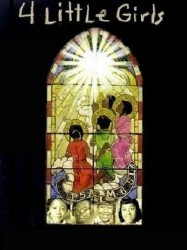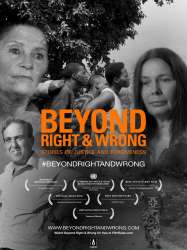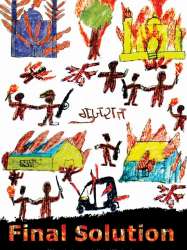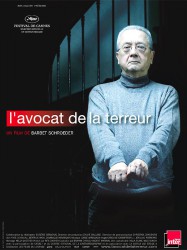Naga Story: The Other Side of Silence est un film de genre Documentaire
Naga Story: The Other Side of Silence (2003)

Si vous aimez ce film, faites-le savoir !
- Infos
- Casting
- Infos techniques
- Photos
- Vidéos
- Passages TV
- Citations
- Personnages
- Musique
- Récompenses
Durée 1h4
Genres Documentaire
Naga Story: The Other Side of Silence is a 2003 documentary film by Indian film maker Gopal Menon. The film provides an introduction to the history of the Struggle by Naga people in North- East frontier of the Indian subcontinent, and documents the human rights abuses suffered by the Naga people in more than 50 years of the existence of Independent India. The Naga political struggle is one of the oldest nationality movements in South Asia, continuing till present times. This flm, which took 5 years to complete, is the first comprehensive film about the Naga struggle for identity, peace, and justice.
This film is the Winner of the "Spirit of the Himalayas" First Prize at Netherlands Himalayas Film Festival, Amsterdam, 2004. This Film is withdrawn from Mumbai International Film Festival 2004 by Film Makers along with 6 other films as part of the Campaign Against Censorship by Indian filmmakers and screened at the Protest film festival Vikalp
Commentaires
Postez un commentaire :
Suggestions de films similaires à Naga Story: The Other Side of Silence
Il y a 8862 ayant les mêmes genres cinématographiques, 10951 films qui ont les mêmes thèmes (dont 3 films qui ont les mêmes 10 thèmes que Naga Story: The Other Side of Silence), pour avoir au final 70 suggestions de films similaires.Si vous avez aimé Naga Story: The Other Side of Silence, vous aimerez sûrement les films similaires suivants :

The Cats of Mirikitani (2006)
, 1h14Genres Documentaire
Thèmes Les attentats du 11 septembre 2001, La prison, Le racisme, Religion, Le terrorisme, Transport, Aviation, Documentaire sur l'art, Documentaire sur la discrimination, Documentaire sur le droit, Documentaire sur la guerre, Documentaire historique, Documentaire sur une personnalité, Documentaire sur la politique, Documentaire sur la religion, Documentaire sur les technologies, Documentaire sur le terrorisme, Politique, Religion musulmane, Documentaire sur la Seconde Guerre mondiale, Film catastrophe, Film de catastrophe aérienne, Détournement d'avion
Note81%





In 2001 Japanese American painter, Jimmy Mirikitani (born Tsutomu Mirikitani), and over 80 years old, was living on the streets of lower Manhattan. Filmmaker, Linda Hattendorf, took an interest and began

4 Little Girls (1997)
, 1h42Réalisé par Spike Lee
Origine Etats-Unis
Genres Documentaire, Historique
Thèmes Le racisme, Le terrorisme, Documentaire sur la discrimination, Documentaire sur le droit, Documentaire sur la guerre, Documentaire historique, Documentaire sur une personnalité, Documentaire sur la politique, Documentaire sur le terrorisme, Politique
Acteurs Ossie Davis, Spike Lee, Bill Cosby, Walter Cronkite
Note77%





Film documentaire, 4 little girls revient sur l'attentat à la bombe dans une église afro-américaine qui, en 1963, tua quatre fillettes âgées de 11 à 14 ans.

Being Osama (2004)
Réalisé par Mahmoud Kaabour
Origine Canada
Genres Documentaire
Thèmes Les attentats du 11 septembre 2001, Le racisme, Religion, Le terrorisme, Transport, Aviation, Documentaire sur la discrimination, Documentaire sur le droit, Documentaire sur la guerre, Documentaire historique, Documentaire sur une personnalité, Documentaire sur la politique, Documentaire sur la religion, Documentaire sur les technologies, Documentaire sur le terrorisme, Documentaire sur les villes, Politique, Religion musulmane, Film catastrophe, Film de catastrophe aérienne, Langues et la traduction, Détournement d'avion
Note70%





The documentary details the lives of six Montreal Arab men, all with the first name "Osama":
 , 1h20
, 1h20Réalisé par Roger Spottiswoode
Origine Etats-Unis
Genres Documentaire
Thèmes Afrique post-coloniale, Le racisme, Religion, Le terrorisme, Documentaire sur la discrimination, Documentaire sur le droit, Documentaire sur la guerre, Documentaire historique, Documentaire sur une personnalité, Documentaire sur la politique, Documentaire sur la religion, Politique, Religion juive
Note71%






Final Solution (2004)
Genres Documentaire
Thèmes Le racisme, Le terrorisme, Documentaire sur la discrimination, Documentaire sur le droit, Documentaire sur la guerre, Documentaire historique, Documentaire sur la politique, Documentaire sur le terrorisme, Politique
Note86%





Part 1: Pride and Genocide deals with the carnage and its immediate aftermath. It examines the patterns of pre-planned genocidal violence (by right-wing Hindutva cadres), which many claim was state-supported, if not state-sponsored. The film reconstructs through eyewitness accounts the attack on Gulbarg and Patiya (Ahmedabad) and acts of barbaric violence against Moslem women at Eral and Delol/Kalol (Panchmahals) even as Chief Minister Modi traverses the state on his Gaurav Yatra

L'avocat de la terreur (2007)
, 2h15Réalisé par Barbet Schroeder
Origine France
Genres Documentaire
Thèmes Le terrorisme, Documentaire sur le droit, Documentaire sur la guerre, Documentaire historique, Documentaire sur une personnalité, Documentaire sur la politique, Documentaire sur le terrorisme, Politique
Acteurs Barbet Schroeder
Note70%





Jacques Vergès est né « colonisé » (selon ses propres termes) en 1925 à Ubone au Siam, dans l'actuelle Thaïlande(ou en 1924). Sa mère est vietnamienne et son père est réunionnais, consul de France au Siam au moment de sa naissance.

Flower in the Gun Barrel (2008)
Origine Etats-Unis
Genres Documentaire
Thèmes Afrique post-coloniale, Le racisme, Documentaire sur la discrimination, Documentaire sur le droit, Documentaire sur la guerre, Documentaire historique, Documentaire sur une personnalité, Documentaire sur la politique, Politique
Note80%





To a large extent, the film consists of interviews with genocide survivors, many of whom were children in 1994. In all, over thirty survivors, perpetrators, and experts were interviewed for the film. In these interviews, the survivors discuss what it means to be a Rwandan and to live next door to people who killed their families. The survivors describe how they deal with their country's request that they forgive one another and move on, so that Rwanda can rebuild and unify itself. Perpetrators' views illuminate the madness that seized the culture in 1994; exploring the experience of apologizing to victims, and examining what it is like to be looked at as a murderer in Rwandan society.

Harvest of Empire (2012)
, 1h30Origine Etats-Unis
Genres Documentaire
Thèmes Le terrorisme, Documentaire sur le droit, Documentaire sur la guerre, Documentaire historique, Documentaire sur une personnalité, Documentaire sur la politique, Documentaire sur le terrorisme, Politique
Note75%






Réalisé par Gail Dolgin
Genres Documentaire, Historique
Thèmes Le racisme, Documentaire sur la discrimination, Documentaire sur le droit, Documentaire sur la guerre, Documentaire historique, Documentaire sur une personnalité, Documentaire sur la politique, Documentaire sur la santé, Politique
Note6%






The Making of a Martyr (2006)
Origine Canada
Genres Documentaire
Thèmes Afrique post-coloniale, Religion, Le terrorisme, Documentaire sur le droit, Documentaire sur la guerre, Documentaire historique, Documentaire sur une personnalité, Documentaire sur la politique, Documentaire sur la religion, Documentaire sur le terrorisme, Politique, Religion juive, Religion musulmane
Note69%





 Connexion
Connexion